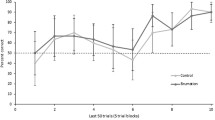Summary
Effect of ECS on memory retention was studied in Octopus vulgaris. Two methods of training were used.
-
1.
Animals trained in a shuttle-box to swim from a dark to a light compartment and to remain there during 25 sec to avoid electroshock, were given 20 learning trials on Day 1 and 10 retention trials 3 days later. No improvement in the performance occurred concerning anticipatory runs to the light compartment but a significant decrease in the number of returns to the dark compartment (incorrect crossings) during Day 1 was recorded. ECS within 1 min after trial 20 caused significant deficits in retention.
-
2.
Animals that previously had been learnt to attack a vertical rectangle moved up and down, were given 30 trials during which if octopuses attacked the shape they would now receive a shock. 15 retention trials were run 2 days later. ECS within 1 min after trial 30 caused significant deficit in retention.
Similar content being viewed by others
References
Adams, H. E., and D. J. Lewis: Electroconvulsive shock, retrograde amnesia, and competing responses. J. comp. physiol. Psychol. 55, 299–301 (1962a).
—: Retrograde amnesia and competing responses. J. comp. physiol. Psychol. 55, 302–305 (1962b).
Brady, J. V., and H. F. Hunt: A further demonstration of the effects of electroconvulsive shock on a conditioned emotional response. J. comp. physiol. Psychol. 44, 204–209 (1951).
Chorover, S. L., and P. H. Schiller: Reexamination of prolonged retrograde amnesia in one-trial learning. J. comp. physiol. Psychol. 61, 34–41 (1966).
Coons, E. E., and N. E. Miller: Conflict versus consolidation of memory traces to explain “retrograde amnesia” produced by ECS. J. comp. physiol. Psychol. 53, 524–531 (1960).
Davis, R. E., P. J. Bright, and B. W. Agranoff: Effect of ECS and puromycin on memory in fish. J. comp. physiol. Psychol. 60, 162–166 (1965).
Deutsch, J. A.: Higher nervous function: The physiological bases of memory. Ann. Rev. Physiol. 24, 259–286 (1962).
Glickman, S. E.: Perseverative neural processes and consolidation of the memory trace. Psychol. Bull. 58, 218–233 (1961).
Hunt, H. R., and J. V. Brady: Some effect of electroconvulsive shock on a conditioned emotional response (“anxiety”). J. comp. physiol. Psychol. 44, 88–98 (1961).
Maldonado, H.: The positive and negative learning process in Octopus vulgaris Lamarck. Influence of the vertical and median superior frontal lobes. Z. vergl. Physiol. 51, 185–203 (1965).
McGaugh, J. L., and L. F. Petrovich: Neural consolidation and electroconvulsive shock reexamined. Psychol. Rev. 73, 382–387 (1966).
McIver, A., and H. C. Nielson: Effect of electroconvulsive shock and grid shock on open field behaviour. J. comp. physiol. Psychol. 62, 102–107 (1966).
Russell, W. R.: Brain, memory, learning. Oxford: Claredon Press 1959.
Vanderwolf, C. H.: Improved shuttle-box performance following electroconvulsive shock. J. comp. physiol. Psychol. 56, 983–986 (1963).
Williams, G. J.: The effect of electroconvulsive shook on an instrumental conditioned emotional response (“conflict”). J. comp. physiol. Psychol. 54, 633–637 (1961).
Young, J. Z.: Learning and discrimination in the Octopus. Biol. Rev. 36, 32–96 (1961).
—: The organization of a memory system. Proc. roy. Soc. B. 163, 285–320 (1965).
Author information
Authors and Affiliations
Additional information
The author is indebted to Professor J. Z. Young for valuable help and discussion. Construction of apparatus used in this research has been sponsored by the Department of Scientific and Industrial Research, England. The table used in the Naples Zoological Station was sponsored by the American Institute of Biological Sciences. Figures have been drawn by Mr. J. Machin.
Rights and permissions
About this article
Cite this article
Maldonado, H. Effect of electroconvulsive shock on memory in Octopus vulgaris Lamarck. Z. Vergl. Physiol. 59, 25–37 (1968). https://doi.org/10.1007/BF00298809
Received:
Issue Date:
DOI: https://doi.org/10.1007/BF00298809




